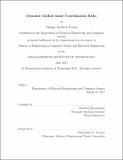| dc.contributor.advisor | Mardavij Roozbehani. | en_US |
| dc.contributor.author | Vieira, Thiago Andrew | en_US |
| dc.contributor.other | Massachusetts Institute of Technology. Department of Electrical Engineering and Computer Science. | en_US |
| dc.date.accessioned | 2018-02-08T15:58:01Z | |
| dc.date.available | 2018-02-08T15:58:01Z | |
| dc.date.copyright | 2017 | en_US |
| dc.date.issued | 2017 | en_US |
| dc.identifier.uri | http://hdl.handle.net/1721.1/113445 | |
| dc.description | Thesis: M. Eng., Massachusetts Institute of Technology, Department of Electrical Engineering and Computer Science, 2017. | en_US |
| dc.description | This electronic version was submitted by the student author. The certified thesis is available in the Institute Archives and Special Collections. | en_US |
| dc.description | Cataloged from student-submitted PDF version of thesis. | en_US |
| dc.description | Includes bibliographical references (pages 65-67). | en_US |
| dc.description.abstract | We study a dynamic global game model of coordination risk among a group of agents invested in a project over a finite time horizon. Once every round each agent gets a private noisy signal of the health of the project. The agent must then decide to continue participating in the project in anticipation of receiving a full return on their investment upon the projects successful completion or foreclose on the project early and receive a reduced payout. This model extends the debt global game models of coordination risk by Morris and Shin to a multi period model similar to Dynamic Global Game Models of Angeletos, Hellwig and Pavan. This extended model allows us to study coordination risk over a finite time horizon and introduce new information structures of the the agents invested in the project. Our main results come from extensions to the dynamic global game model. First, we model public signals of the health of the project between all agents invested in it and show under certain conditions that positive public information of the project can decrease the projects chances of success. Second, we allow for agents to receive private and public noisy signals of past actions, introducing herd behaviour. We then show how this herd behaviour can increase the fragility of the system to external shocks of public or private information concerning the fundamentals of the project. Last, we introduce feedback into the reserve price that agents receive upon leaving the project early. We show that this feedback can be a positive or negative force on the health of the project. We conclude with an interpretation of the model to real world bond yields and numerical examples. | en_US |
| dc.description.statementofresponsibility | by Thiago Andrew Vieira. | en_US |
| dc.format.extent | 67 pages | en_US |
| dc.language.iso | eng | en_US |
| dc.publisher | Massachusetts Institute of Technology | en_US |
| dc.rights | MIT theses are protected by copyright. They may be viewed, downloaded, or printed from this source but further reproduction or distribution in any format is prohibited without written permission. | en_US |
| dc.rights.uri | http://dspace.mit.edu/handle/1721.1/7582 | en_US |
| dc.subject | Electrical Engineering and Computer Science. | en_US |
| dc.title | Dynamic global game coordination risks | en_US |
| dc.type | Thesis | en_US |
| dc.description.degree | M. Eng. | en_US |
| dc.contributor.department | Massachusetts Institute of Technology. Department of Electrical Engineering and Computer Science | |
| dc.identifier.oclc | 1020174779 | en_US |
